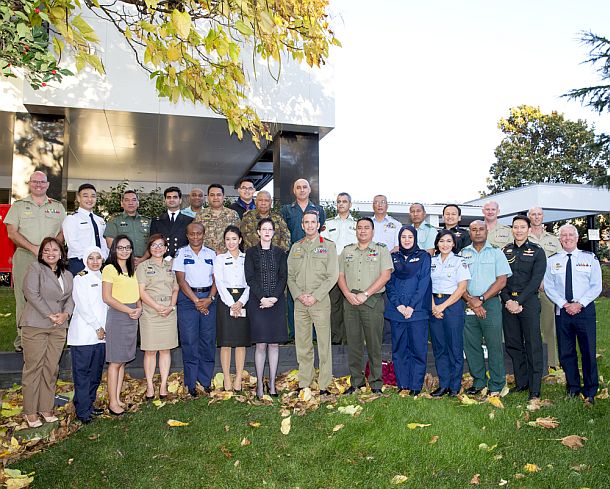The Department of Defence and the ADF are busy engaging with regional partners this month, with the fourth strategic communication workshop having taken place in Canberra last week and a peacekeeping exercise hosted by Australia and Thailand having commenced this Monday.
The role of military and security public information in addressing violent extremism was the centrepiece of an international military workshop held in Canberra with a total of 24 military and security personnel from 10 countries attending the fourth such event held since 2010 in support of the Defence Cooperation Program.
Australia and Thailand are co-hosting a peacekeeping exercise, PIRAP JABIRU 2016, involving over 100 participants from the Indo–Pacific region from 9-20 May 2016 in Bangsaen, Thailand.
The strategic communication workshop provided a forum for Australian and foreign military and security officers to discuss the military’s role in the provision of public information. Participating countries include Pakistan, Indonesia, the Philippines, Singapore, Thailand, Malaysia, Jordan, Lebanon, Papua New Guinea and Vanuatu.
Participants contributed to discussions on public information support to major events, countering violent extremism, and the use of social media. Director General Military Information, Brigadier Dan Fortune, said the workshop supported Australia’s aim of working with regional countries to respond to security challenges.
“The workshop reinforced the importance of public information to the conduct of military and security operations and provided an excellent opportunity to strengthen our relationships with those in our region who undertake this role,” BRIG Fortune said.
“This year we focused on the role of information in combating violent extremism, which is as much about individual attitudes as it is about capability.”
“We heard from experts in the field and discussed the various approaches of our regional partners and the shared challenges we all face,” he said.
The workshop also drew on Australia’s experience in hosting major international events to discuss how information campaigns and effective interagency cooperation contributed to the public’s confidence in the security of the events.
Commander Australian Defence College, Major General Simone Wilkie, who is in Thailand to open PIRAP JABIRU 2016, said the exercise is a fantastic opportunity to bring together representatives from 22 Indo-Pacific militaries, police forces, and non-governmental organisations to consider the current issues facing peacekeepers and to identify strategies to meet the future challenges.
 Group photo of the International Policy Division Strategic Communications Symposium run by the Australian Defence Force in Canberra, ACT. 23 Participants from nine countries attended the Symposium from 02-06 May 2016. Credit: Defence
Group photo of the International Policy Division Strategic Communications Symposium run by the Australian Defence Force in Canberra, ACT. 23 Participants from nine countries attended the Symposium from 02-06 May 2016. Credit: Defence
“The true value of the PIRAP JABIRU series is that it enables participants to develop a much deeper understanding of contemporary multi-dimensional UN Missions and most importantly how we can work together to achieve optimal results,” MAJGEN Wilkie said.
“Participants will be tested by realistic scenario-based problems that reflect contemporary UN operations including how to protect vulnerable populations such as women and children, understanding peacekeepers’ rights and obligations under international and domestic law and how to maintain logistics support in often austere environments. Participants will work together to develop comprehensive approaches to these problems,” she said.



